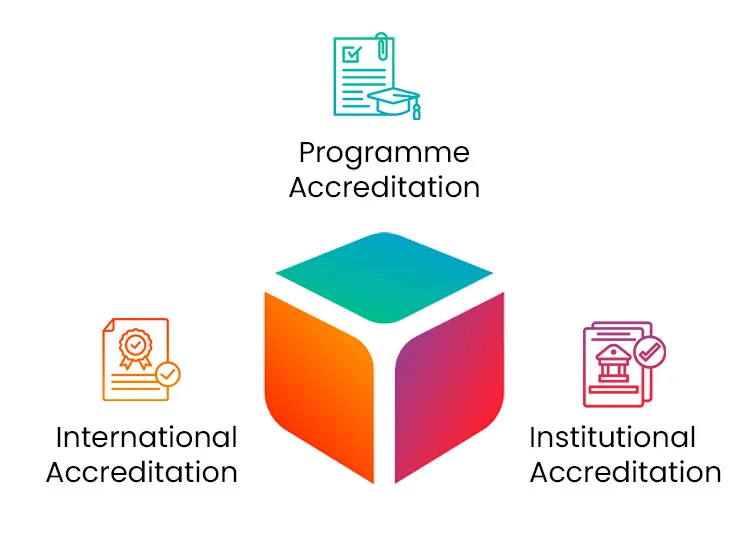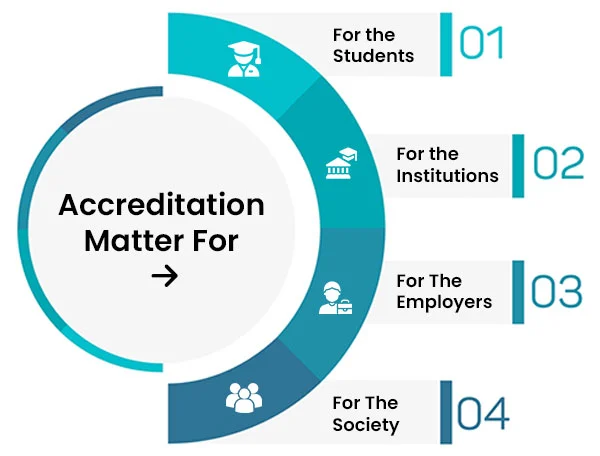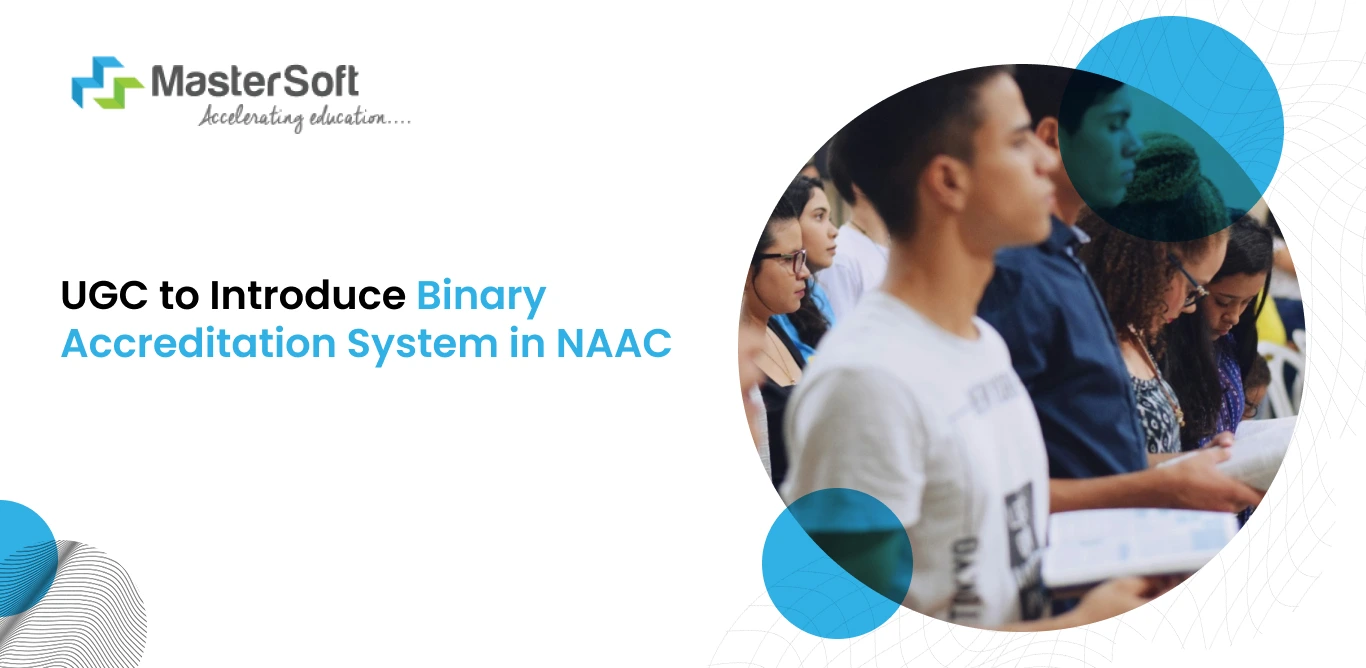04, March 2024
“Accreditation” is often used in education and educational institute management. However, very few have a complete understanding of what accreditation is, what its types are, and why it matters.
In India, multiple types of accreditation are granted by various bodies, all under the University Grants Commission (UGC). Today, we will discuss what accreditation is, what its types are, and why it matters.
We will also discuss the Accreditation Data Management System (ADMS), which is a cloud-based software. ADMS integrates with college and school ERP and helps educational institutions with accreditation of their institutes
Let us begin by understanding.
Complete Guide To The National Board Of Accreditation (NBA Accreditation)
What is Accreditation?
“is a process of quality assurance and improvement, whereby a programme in an approved Institution is critically appraised to verify that the Institution or the programme continues to meet and/or exceed the Norms and Standards prescribed by regulator from time to time. It is a kind of recognition which indicates that a programme or Institution fulfills certain standards.”
This means that accreditation is an evaluation process through which educational institutions and their programmes get recognition. This means the said institution has met and even exceeded the standards set by the regulator or respective educational body.
Accreditation helps in ensuring that students receive a high-quality education that meets society's and employer’s expectations. It enhances the credibility and reputation of the institutions and programmes. facilitates their recognition and mobility at the national and international levels.

There are three main types of accreditation in India:
- International Accreditation
- Programme Accreditation
- Institutional Accreditation
Let’s take a deeper look at each of them one by one.
International Accreditation
Starting with International Accreditation, it is a type of accreditation that is granted by global bodies that have established their standards for education quality in higher education. It helps educational institutions enhance their institutes’ and their programmes’ international recognition and promotes global competitiveness and collaboration among them.
International accreditation also offers institutions an opportunity to establish and benchmark themselves against the best practices and innovations in the world.
Depending on the field or discipline of the institution or programme, many bodies provide international accreditation in India. Some of them are mentioned below:
Association to Advance Collegiate Schools of Business (AACSB):
AACSB is a US-based body established in 1916 that accredits business schools and programmes in management, accounting, and other disciplines.
International Organisation for Standardisation (ISO):
The International Organisation for Standardisation (ISO) is a Switzerland-based body that was established in 1947. It accredits the quality management systems of institutions and programmes in various fields and disciplines.
Accreditation Board for Engineering and Technology (ABET):
ABET is another US-based body that was established in 1932. It accredits engineering and technology programmes in various disciplines.
Thanks to these accreditation bodies, educational institutions can get globally accredited. With that done, let's move on to the next accreditation type.
Programme Accreditation
Programme accreditation, as the name suggests, is a type of accreditation that is given to specific programmes or courses. This is done based on the quality and relevance of the programme or courses. It covers aspects of the programme, such as its objectives, curriculum, delivery, assessment, outcomes, and alignment with industry and society.
Programme accreditation helps ensure that the students get the necessary knowledge, skills, and competencies required for their chosen career path. It also enables the recognition and transfer of credits among different institutions and programmes. This facilitates the mobility and employability of the graduates.
Various bodies provide programme accreditation in India, depending on the field or discipline of the programme. Some of the major ones are:
All India Council for Technical Education (AICTE):
AICTE was established by the Government of India in 1987. It accredits technical and professional programmes in engineering, management, pharmacy, architecture, and other disciplines.
Medical Council of India (MCI):
MCI was established by the Government of India in 1934. It accredits medical programmes in allopathy, dentistry, nursing, and other disciplines.
Indian Council of Agricultural Research (ICAR) :
ICAR is an autonomous body that was established by the Government of India in 1929. It accredits agricultural programmes in agriculture, horticulture, veterinary, fisheries, and other disciplines.
National Council for Teacher Education (NCTE) :
Another statutory body established by the Government of India in 1993 is the NCTE. It accredits teacher education programmes in elementary, secondary, and higher education.
Bar Council of India (BCI):
Lastly, BCI is another prominent body established by the Government of India in 1961. It accredits legal education programmes in law and related disciplines.
What Is AICTE? Role Of All India Council For Technical Education
With that, let’s move on to the last type of accreditation in India,
Institutional Accreditation
Institutional accreditation is the type of accreditation that is granted to the entire institution as a whole. This accreditation is provided based on its overall performance and quality. Institutional accreditation covers various aspects of the institution, such as its:
- Vision
- Mission
- Governance
- Infrastructure
- Faculty
- Curriculum
- Teaching-learning
- Research
- Innovation
- Extension
- Student support
- Outcomes
Institutional accreditation helps in identifying the most acceptable institutions for programme enrollment. It also reflects the value of the degree or certificate that the institution offers.
Two main bodies offer institutional accreditation in India:
1. The National Assessment and Accreditation Council (NAAC)
2. The National Board of Accreditation (NBA).
NAAC is an autonomous body that was established by the UGC in 1994. It evaluates institutions based on seven criteria and then awards them with grades from A++ to D (highest to lowest).
The NBA is another autonomous body established in 1994. It evaluates the programmes based on the principles of outcome-based education (OBE). Based on this evaluation, It awards them ratings from 1 to 5, with 5 being the highest.
MasterSoft's Outcome-Based Assessments: Easy Accreditation For Institutional Growth
These two bodies hold high importance for accreditation in India. Let us understand them better.
NAAC Accreditation
NAAC accreditation is granted by the National Assessment and Accreditation Council, which is an autonomous body established by the UGC in 1994. As mentioned earlier, NAAC accredited universities and colleges, based on seven criteria, which are:
- Curricular aspects
- Teaching-learning and Evaluation
- Research, innovation and extension
- Infrastructure and learning resources
- Student support and progression
- Governance, leadership and management
- Institutional values and best practices.
NAAC awards grades to institutions from A++ to D, with grade D being the lowest. This is based on the cumulative grade point average (CGPA) of the institutions. NAAC helps ensure the quality and standards of higher education in India. It also helps to promote the academic excellence and social relevance of the institutions.
NBA Accreditation
The National Board of Accreditation, or NBA Accreditation, is another autonomous accreditation body that was established by UGC in 1994. The NBA takes charge of accrediting technical and professional programmes offered by the institutions. These include programmes like engineering, management, pharmacy, architecture, and others.
Based on the principles of outcome-based education (OBE), the NBA focuses on the attainment of the programme outcomes and the graduate attributes. The NBA awards ratings from 1 to 5 (highest) to the programmes depending on their level of compliance with the accreditation criteria.
NBA accreditation assists in ensuring the quality and relevancy of technical and professional education in India, enhancing graduates’ global recognition.
The NBA is a full-fledged member of the Washington Accord. It is an international agreement that facilitates the mutual recognition of engineering degrees among the signatory countries.
Now you understand what accreditation is and the different types of accreditation in India. However, this process requires careful and streamlined management of a large amount of institutional data.
This is where the Accreditation Data Management System (ADMS) steps in to help institutions. Let’s understand it better
What is an Accreditation Data Management System (ADMS)?
The Accreditation Data Management System (ADMS) is a cloud-based system developed by MasterSoft. It helps educational institutions and programmes seamlessly update and manage the data and documents required for various accreditation processes. It also helps generate the reports in the desired formats.
ADMS is an advanced edTech tool that simplifies the accreditation process. It helps educational institutions and programmes save time and resources. It can easily integrate with different LMS and ERP software, such as college and school ERPs
The Accreditation Data Management System offers the following features and benefits, which are listed below:
- Multiple logins so that multiple approved users can enter and update data.
- Streamlined provision for uploading necessary documentation and data.
- Auto-generation of reports in required formats as per respective accreditation body requirements.
- Real-time analytics and dashboards to monitor the progress and status of data entry and accreditation.
- Centralised data repository with high security and data backup, ensuring data security.
- Paperless approach to online data collection and management, reducing chances of errors.
- Standard-based tracking and compliance with various accreditation norms and regulations.
- Data migration and integration with SIS, LMS, assessments, school ERPs, and other modules and software.
The Accreditation Data Management System also supports multiple accreditations across multiple campuses, such as NAAC, NBA, NIRF, ABET, AACSB, and others. ADMS has proven to be extremely helpful in improving educational institution’s quality and performance.
With the Accreditation Data Management System, educational institutions can boost their accreditation process, achieving their objectives faster and more efficiently.
Now you are completely updated on everything you need to know about accreditation in India, except one thing. That is,
Why does Accreditation Matter?
Accreditation has a very important impact on students, institutions, employers, and society. It offers numerous benefits and advantages for all of them. Here are some reasons why accreditation matters:

For the Students:
Accreditation helps them choose the right institution and programme for their education. This ensures that they receive a quality education that meets their expectations and goals.
Accreditation also helps to improve their learning outcomes and employability. It also assists them in pursuing higher studies or career opportunities in India or abroad.
For the Institutions:
Accreditation helps them improve their performance and quality and achieve their vision and mission. It also plays a part in enhancing their credibility and reputation. This, in turn, helps them attract and retain the best faculty and students.
Accreditation also helps to foster a culture of excellence and innovation, which contribute to the social and economic development of the nation.
For The Employers:
Accreditation helps employers identify qualified and competent graduates who can meet their requirements and expectations. It also helps to ensure that the graduates have the relevant knowledge, skills, and competencies needed for their profession or career.
Accreditation also helps to facilitate collaboration and partnerships between industry and academia. This promotes the lifelong learning and professional development of employees.
For The Society:
Lastly, accreditation helps to ensure that the higher education system is accountable and responsive to the needs and demands of stakeholders and society. It also helps to promote the quality and excellence of the higher education system and enhance its diversity and inclusiveness.
Conclusion
Accreditation for Indian education serves as a robust quality assurance process. Covering both institutional and program-specific evaluations, it extends its reach to the international stage through recognised bodies like AACSB, ABET, and ISO.
Helping with this journey is the Accreditation Data Management System (ADMS) by MasterSoft. It is a valuable tool that helps institutions seamlessly manage data and generate required reports, streamlining the accreditation process.
The significance of accreditation spreads across students, institutions, and society at large. It ensures students receive a quality education aligned with their aspirations, while institutions get enhanced global recognition.
Accreditation, in essence, functions as a compass, directing educational institutions towards excellence and global honour.
Explore the world of accreditation with ADMS - Your gateway to educational excellence!
Mobile: 08448010216
Email:info@mastersofterp.com












